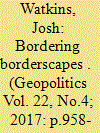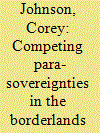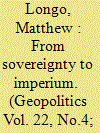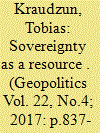|
|
|
Sort Order |
|
|
|
Items / Page
|
|
|
|
|
|
|
| Srl | Item |
| 1 |
ID:
156833


|
|
|
|
|
| Summary/Abstract |
This article documents Australia’s use of border security support and humanitarian aid as border externalisations immobilising asylum seekers as far from Australia as possible. The Australian Government frames border securitisation through regionalism, as an effort to achieve a “regional solution” to asylum seeking irregular migration. Correspondingly, scholars have documented Australia’s externalisations in Southeast Asia and the Pacific. However, Australia’s efforts are not regionally circumscribed and this article analyses the spatial and temporal flexibility of Australia’s border externalisations; Australia’s strategy of targeting borderscapes of asylum seeking as they emerge and change. In doing so, the article examines how the Australian Government has assembled externalisations in South Asia, the Middle East, and North Africa. Australia’s use of humanitarian aid to make places housing asylum seekers more hospitable, yet confining, to the displaced is detailed. Also analysed is Australia’s border security support to source countries and countries of first asylum to immobilise asylum seekers. The article demonstrates that Australia has sought to manifest not only a territorial buffer zone in Southeast Asia, but use border externalisations in the Middle East, South Asia, and North Africa to secure places and displaced populations. This is argued to be a preventative strategy of risk management designed to preempt future asylum geographies and forge extraterritorial migration control.
|
|
|
|
|
|
|
|
|
|
|
|
|
|
|
|
| 2 |
ID:
156825


|
|
|
|
|
| Summary/Abstract |
This article is broadly concerned with how we conceptualise the geography of the tensions between the nominally stable orders of the modern state system against the turbulence of the past few decades in relation to that order, especially in the realm of border controls. Specifically, it considers the rescaling and relocation of border enforcement in the European Union in relation to state sovereignty. The article argues that existing “soft” conceptualisations of the EU’s relationship to sovereignty and bordering—“shared,” “joint,” “multi-level,” “consociational”—are inadequate to understand the transformations of exercises of sovereign power in European borderlands. Instead, we are witnessing the emergence of competing para-sovereignties acting within the same spaces, with both traditional states and the incipient state-like EU fulfilling particular bit roles in realms that were traditionally viewed as the exclusive responsibilities of modern, sovereign, territorial states. This dynamic is made visible in recent years in observing individual humans negotiate and subvert the fluid political geographies of European border space. Examples are taken from the activities of the EU border agency Frontex in southeastern Europe.
|
|
|
|
|
|
|
|
|
|
|
|
|
|
|
|
| 3 |
ID:
156824


|
|
|
|
|
| Summary/Abstract |
Borders are changing in myriad and multifaceted ways. After 9/11, states redoubled efforts at shoring up their perimeters and building walls. But borders are not merely increasingly securitized, they are also becoming thicker and bi-national. This new ‘zonal’ border emerging worldwide radically shifts the debate about borders and sovereignty. If sovereignty is indivisible, unitary and final, how can it be shared between states at their mutual perimeters? Is this really evidence of sovereignty waning? In this article, I suggest we are stuck at this conceptual impasse because of two conflations. The first one involves two aspects of sovereignty: authority and control. Looking at borders as thin jurisdictional lines, we observe only their legal authority (de jure); instead, by examining changing modes of control, we can see how new securitized borders actually reinforce state strength. The second conflation revolves around the conceptual linking of borders, states and sovereignty. This article argues that as borders thicken, they start to resemble frontiers, and sovereignty starts to resemble imperium – a Roman designation for political authority that is territorially unbounded. This disrupts the border/state dyad and situates borders (lines) and frontiers (zones) on a continuum. In doing so, it reveals how sovereignty is not waning, but changing shape – a worrisome geopolitical conclusion given the possibilities of neo-Imperialism due to power asymmetries between neighbouring states.
|
|
|
|
|
|
|
|
|
|
|
|
|
|
|
|
| 4 |
ID:
156826


|
|
|
|
|
| Summary/Abstract |
Recognising how the concept of sovereignty has been affected by an indigenous and human rights agenda, this article explores the potential outcomes of the United Nations Declaration on the Rights of Indigenous Peoples (UNDRIP) in terms of its challenge to Westphalian notions of sovereignty in Canada’s North. It argues that the UNDRIP, adopted by the United Nations in 2007, is now playing a significant role in giving Canada’s Indigenous Peoples a voice in international affairs and for reframing the relationship between state and non-state actors in ways which privilege collective rights rather than territorial imperatives.
|
|
|
|
|
|
|
|
|
|
|
|
|
|
|
|
| 5 |
ID:
156829


|
|
|
|
|
| Summary/Abstract |
Cigarette smuggling across Brazil’s borders with Paraguay, Uruguay and Argentina involves large amounts of merchandise and money. The public in Brazil associates this activity with images of war, contamination and other threats to state sovereignty. This article assesses the political meaning and uses of smuggling in order to challenge the assumption that smuggling threatens the sovereignty of the Brazilian state. With the help of a literature review, fieldwork at the border, interviews with practitioners, a cartographic analysis of news coverage of seizures, the tobacco production and consumption, the market and its regulation, actors, routes and networks were mapped and analysed. In the Southern Cone of South America, an integrated transborder territory emerges where tobacco is cultivated, prepared and distributed, and cigarettes are manufactured, transported, sold and smoked. These flows cross distinct legal framings and lead to an increase in danger and profit. Thus, the market is segmented between national legal products and imported cigarettes that are cheaper and illegal but easily obtainable. The concepts of political commodities understood as the acts of powerful agents who barter advantages related to their authority and sovereignty management, understood as the use of legal (state-managed) structures according to private interests at different scale levels, provide useful theoretical tools to examine the territorialisation of the cigarette smuggling and its control by the state and private agents. We conclude that tobacco production and trade, as well as cigarette smuggling, are connected via agents who use the border to build the legal market and, consequently, to increase the trade value of national tobacco. Cigarette smuggling across the state borders of the Southern Cone combines networks and places in such a way that is integrated into the legal economy and the national territories, and it does not defy state’s sovereignty.
|
|
|
|
|
|
|
|
|
|
|
|
|
|
|
|
| 6 |
ID:
156831


|
|
|
|
|
| Summary/Abstract |
This paper argues that the way NATO conducts its interventions has altered since the Global Financial Crisis. The pressures of the Global Financial Crisis have forced NATO to shift from the sustained peacekeeping operation in Afghanistan to what I refer to as the trans-scalar space of intervention in Libya. Trans-scalar spaces of intervention are spaces where violence is temporarily concentrated by a transnational military apparatus to eliminate a perceived threat as efficiently as possible. The threats targeted are contained within a particular national locale and are unable to manifest themselves transnationally; their capacity is therefore several orders of magnitude below the force projection abilities of the transnational military force seeking its destruction. I examine how NATO’s creation of these new types of spaces has impacted global security and undermined territorial-based forms of governance. Despite the ensuing chaos which enveloped Libya after NATO departed, with their low cost and speed at which they can be organized this style of intervention will likely be replicated in the future.
|
|
|
|
|
|
|
|
|
|
|
|
|
|
|
|
| 7 |
ID:
156828


|
|
|
|
|
| Summary/Abstract |
This paper scrutinises the translation of sovereignty into daily actions at the border. The Soviet Union established a heavily securitised and sealed border, which was perpetuated in post-Soviet, civil war-stricken Tajikistan by assigning the task to the Russian Federation’s border forces. After having taken over the task of guarding the border, the slowly recovering post-conflict state tried hard to maintain its own border control. Drawing on interviews with borderland people, this article discusses the convergence of Tajikistan’s strong claim but weak support for sovereignty, with the daily life of the borderland people. It will show how – given the Pamirs’ special status as a border district – far-reaching sovereign authority of state agents, aiming to provide security at the border, has been translated into arbitrary actions ensuring individual benefits and has been hidden by intransparency. The article argues that the lack of adequate support from the central government encourages state representatives at the border to reinterpret the sovereign power assigned to them in order to serve their own individual benefits and purposes. Instead of being used to maintain the state territory, the sovereignty’s power is diverted to serve individual interests, in the end serving to destabilize the border, the opposite of the intended purpose.
|
|
|
|
|
|
|
|
|
|
|
|
|
|
|
|
| 8 |
ID:
156827


|
|
|
|
|
| Summary/Abstract |
This article advances a subaltern geopolitics of sovereignty production at the borders of the DR Congo – the supposedly most fragile – and South Sudan – the youngest state in Africa. Moving beyond critiques of representing postcolonial statehood and sovereignty in terms of ‘lack’ and ‘failure’, we localise and ground analysis by drawing on Butler’s figure of the ‘petty sovereign’‘ to analyse the agency of border officials at the DR Congo/Rwanda and the South Sudan/Uganda border who we refer to as ‘sovereignty entrepreneurs’: officials who, tasked with managing and controlling the border, in constant face-to-face negotiations and closely linked to resource competition prescribe, set and decide on the terms and conditions of border crossing. It is argued that in the context of the DR Congo and South Sudan, where the states’ claims to territorial sovereignty face similar internal and external challenges, the border work of sovereignty entrepreneurs, characterised by the ability to tax, threaten and discipline with impunity, represents a form of sovereign power that renders the state’s capacity to act excessively visible at its borders.
|
|
|
|
|
|
|
|
|
|
|
|
|
|
|
|
| 9 |
ID:
156823


|
|
|
|
|
| Summary/Abstract |
This thematic section is dedicated to the discussion of conceptual and practice-inspired approaches to the entanglement of sovereignty and borders. The production of this thematic section is accompanied by an astonishing amount of uprising public debates on sovereignty: the so-called ‘Brexit’, the so-called ‘Muslim ban’, debates about stricter border controls, extraterritorial detentions camps and more restrictive asylum policies in the run-up to elections in some European countries indicate that sovereignty itself has become a topic of public concern. And it is not just sovereignty that concerns people and politicians, but a perceived loss of sovereignty by the nation-state and a necessity to regain and strengthen it. The newly sparked interest in sovereignty revolves around issues of security, border and migration control, access to resources and social security systems as well as questions of finance. Though there has always been a good amount of scepticism regarding security issues versus open borders
|
|
|
|
|
|
|
|
|
|
|
|
|
|
|
|
| 10 |
ID:
156832


|
|
|
|
|
| Summary/Abstract |
The violence and insecurity that Mexico suffered during former President Calderon’s war on the Mexican drug cartels have come at a grave economic cost to many cities. The criminal violence had an impact on interdependent borderlands, which are geographic areas that have a symbiotic link between cities and communities of adjoining territories. Mexican business people and consumers that live in cities along the shared border with the United States have the ability to shift their economic transactions away from their insecure environments and to US border communities. In addition, US residents that would normally travel south for economic transactions would decide to avoid violent areas and therefore conduct business on the northern side. This research demonstrates that increased violence in Mexico produced a positive economic effect on the US side of the Mexico–Texas interdependent borderlands. Specifically, our time series analysis (2002–2014) shows that increased homicides, kidnappings and extortions in adjacent Mexican cities are strongly associated with higher gross total sales in the Texas communities while controlling for economic and demographic factors. We also found that the increases in the three crime categories were not associated with the arts, entertainment and recreation sector, nor the accommodation and food services sector performance. However, there was a positive relationship with the retail sales sector.
|
|
|
|
|
|
|
|
|
|
|
|
|
|
|
|
| 11 |
ID:
156830


|
|
|
|
|
| Summary/Abstract |
Through the use of survey data from the West Bank, this paper explores the effects of the Apartheid/Separation Wall in the occupied territory of the West Bank on Palestinian society. How has the Wall separated a population from their loved ones, their orchards and crops, homes, and overall livelihood? How have these relationships transformed? Place and space have special meanings in Palestinian experience and consciousness, and yet Palestinians remain vulnerable to punishment through control of access to spaces and places.
|
|
|
|
|
|
|
|
|
|
|
|
|
|
|
|
|
|
|
|
|